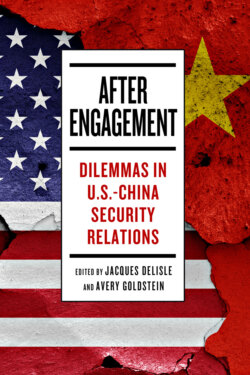Читать книгу After Engagement - Группа авторов - Страница 5
На сайте Литреса книга снята с продажи.
ONE Rivalry and Security in a New Era for US-China Relations JACQUES DELISLE
AVERY GOLDSTEIN
ОглавлениеAt the end of the 1970s, the United States of America and the People’s Republic of China established formal diplomatic relations, and China, under Deng Xiaoping, adopted a transformational agenda of “reform and opening to the outside world.” During the four decades that followed, and despite occasional significant setbacks, the bilateral relationship became broader and deeper. “Constructive engagement” characterized much of Washington’s China policy, and Beijing primarily pursued a policy of integrating with a US-led post–World War II and, later, post–Cold War international order.1 By the later 2010s, however, the relationship had taken a dramatic, negative turn. Beijing had become more pointed in rejecting what it long has depicted as pernicious US efforts to limit China’s rise or shape its internal order. Under Xi Jinping, China also had grown more assertive in seeking to influence the international institutions that China earlier had joined without challenging the status quo.
In Washington, many began to see a rising China as a strategic competitor or geostrategic adversary and a threat to the international order that the United States had led in creating and had long championed. Once-reliable bipartisan support for constructive engagement gave way to calls to confront more forcefully a potentially serious challenge from China.2 During Barack Obama’s presidency, some Americans began to criticize engagement as a naive failure that did not serve US interests. Although skepticism about engagement was not new, it had been a minority view, mostly held by those at the left and right ends of the political spectrum. By the end of the Obama administration, it was becoming a bipartisan consensus embraced by those nearer the center.3 Analysts, including contributors to this volume, began to assess, or reassess, US-China relations in terms—relative power, conflicting interests, and ideational struggle—that had been infrequently invoked in recent decades.
Donald Trump’s election as president in 2016 brought to power a foreign policy team that flatly rejected established approaches to dealing with China. The Trump administration explicitly characterized China as an adversary. Addressing the perceived threat to American interests from China, US policy began to focus on preventing China from narrowing the still-substantial gap in economic wealth, technological prowess, and military power.4 The 2020 US presidential campaign and initial statements from Joe Biden and his foreign policy advisers indicate that these concerns will remain central to Washington’s China policy. Changes in the US agenda—including pursuit of cooperation with China in limited areas and closer coordination with allies that share US concerns about China and its agenda—do not portend a return to constructive engagement or a reversal of the core elements of the bipartisan consensus for tougher China policies that had emerged by the mid-2010s.5
